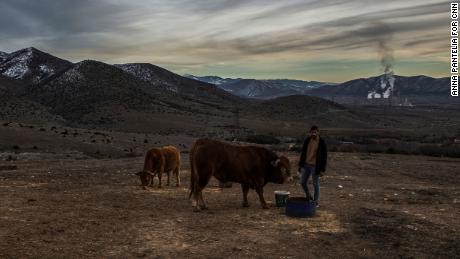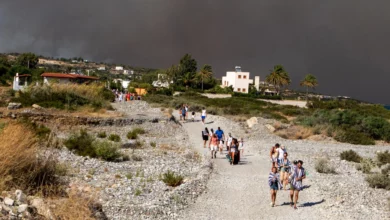
Western Macedonia, Greece (CNN)Dimitris Mitsaris opens his garage door and the smell of fermenting grapes emerges, as the first morning light bounces off dozens of steel tanks. Mitsaris and his family live here, in Agios Panteleimonas, a mountainous village of just 800 residents in northern Greece, and have made their home into a small winery. “I don’t even have electricity here yet,” Mitsaris says with a laugh.
It’s funny to Mitsaris because just until December last year, the 40-year-old had spent 17 years of his life working the coal mines for the state-run Public Power Corporation (PPC) to keep the lights on in people’s homes. He finally gave up coal for wine, understanding that the fossil fuel was on its way out.
Mitsaris, whose father also worked in coal mining, bought 44 acres of vineyard. But he’s now wondering if he made the right choice — coal here is refusing to quit.
“I’m afraid about the future,” he said. “I have two young daughters to bring up.”
Coal is the most polluting of fossil fuels and is the biggest single contributor to the climate crisis, and Greece had been trying hard to wean off it. But the country — alongside other European nations — is delaying those phaseout plans in response to the energy crunch, which has turned into a full-blown crisis since Russia launched its war on Ukraine.
Just a year ago, Greece was confident it could close all existing coal-burning plants by 2023. It planned to build one last coal plant this year in the wider region where Mitsaris lives, Western Macedonia, which generates more than half the nation’s electricity. The new plant, Ptolemaida 5, would in 2025 then run on natural gas, another polluting fossil fuel, but one that is generally less carbon-intensive than the lignite, or brown coal, found in this part of Greece.
The deadline to end the use of coal in all existing plants has been delayed from 2023 to 2025, and Greek Prime Minister Kyriakos Mitsotakis recently suggested the new Ptolemaida plant will realistically need to burn coal until at least 2028. And Greece is planning to hike its coal mining output by 50% over the next two years to make up for the dearth of natural gas, as Vladimir Putin tightens the taps flowing to the EU.
Already the changes are glaring. In June 2021, coal generated 253.9 gigawatt hours (GWh) of electricity. This June, coal was responsible for 468.1 GWh, nearly twice as much.
And this is while the country has been battling wildfires on the mainland and its islands, fueled by a scorching heat wave supercharged by climate change — which comes mostly from humans’ burning of fossil fuels like coal. The fires have left homes in ashes, people have been rescued from beaches and business owners on islands like Lesbos are facing an economically painful holiday season.
Major life choices, like where to live and work, are difficult to make when the government’s plans keep changing. For Mitsaris, leaving his village where he was born and raised isn’t an option right now.
“My wife used to work in a dairy factory, which also closed few years ago. They offered her a job in Athens but back then my salary was enough to support the whole family, so we decided to stay,” he said. “If I knew that we would end up in the situation we are now, I would have gone to Athens back then.”
The Greek government is trying to convince people that its return to coal is only temporary. But coal’s resurgence is tempting people in Western Macedonia back into the industry.
The PPC energy company has offered steady employment to thousands of people in Western Macedonia, where almost 1 in 5 are jobless.
Here — where everyone refers to coal as a “blessing and a curse” — a return to the fossil fuel can make all the difference between staying and leaving.
Already, so many have left for bigger cities, or even moved abroad, to find new lives.
A village in decay
In terms of the transition away from coal, Greece had been something of a success story. Before Russia’s invasion of Ukraine, Greece only relied on coal for around 9% of its energy supply, down from 25% just six years ago. It was the first country in the coal-dependent Balkans to announce a near-term target to end use of the fossil fuel.
But the transition has always had its challenges — mainly, what opportunities can the country offer to former workers in coal towns?
In Western Macedonia — which provides 80% of Greece’s coal — the PPC has expropriated dozens of villages so that it can mine the coal beneath them, moving entire communities to the peripheries. And they were the lucky ones.




